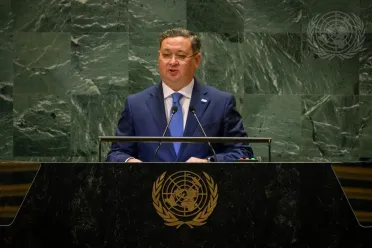Statement
Statement summary
MURAT NURTLEU, Minister of Foreign Affairs of Kazakhstan, urged: “Having yearly discussions about reforming global institutions is no longer enough. It is time to enact the change our world so desperately needs.” Recalling Kazakhstan’s “Initiative of World Unity for a Just Peace and Harmony” presented in 2023, promoting peace and security through engagement between the Global South and Global North, he underlined that “the voices of middle powers and developing nations are vital in bridging divides and nurturing a more effective international security architecture”. The increasing risk of another nuclear arms race is exacerbating geopolitical polarization, he warned, recalling Kazakhstan’s history of enduring 456 nuclear tests, devastating both people and the land. Voicing grave concern about escalating rhetoric around nuclear threats, he called on all nuclear-capable States to adhere to all related treaties including the Comprehensive Nuclear-Test-Ban Treaty.
“Another existential threat no nation can afford to ignore is climate change,” he continued, calling on all G-20 countries and development banks to share the burden by “providing green technologies and concessional financing to low- and middle-income countries in line with the Paris Agreement”. Despite accounting for only 1 per cent of emissions, Central Asia will face a 2.5ºC increase in average temperatures by 2050. To that end, his country will host a Regional Climate Summit in 2026. Moreover, water scarcity, threatening food and ecological systems worldwide, will affect up to 30 per cent of the population of the region if unaddressed. As the current Chair of the International Fund for Saving the Aral Sea, Kazakhstan is working with regional partners on a cooperation mechanism for the effective use of water and energy resources in Central Asia, focusing on irrigation hydropower and environmental protection. His country is also the largest landlocked developing country, he said, voicing alarm that geographical constraints prevent these countries from integrating into global trade networks. For its part Kazakhstan will harness synergies between the Belt and Road project, the Global Gateway Initiative and the North-South and Trans-Caspian International Transport Route corridors to transform “our landlocked status into land-linked connectivity,” he declared.
Turning to the rapid development of artificial intelligence (AI) posing challenges in situations of conflict, data privacy and “information wars”, he called for the UN to take a leading role and establish a UN AI Office to develop ethics and standards for its use. As a bridge for cooperation between East and West, Central Asia is increasingly important in global affairs. With strong relations through the “C5+” dialogue platform, the regional agenda includes developing Afghanistan into a reliable trade partner, he said. Domestically, his country prioritizes human rights, an “antidote” to inequalities that cause instability and conflict, through measures including abolishing the death penalty, instituting a zero-tolerance policy on torture and strengthening national prevention mechanisms. Moreover, as “champion[s] of repatriation of women and children from conflict zones in the Middle East, Kazakhstan will host an International Conference in 2025 on best practices in the field of repatriation and reintegration”, he said.
Full statement
Read the full statement, in PDF format.
Photo

Previous sessions
Access the statements from previous sessions.
